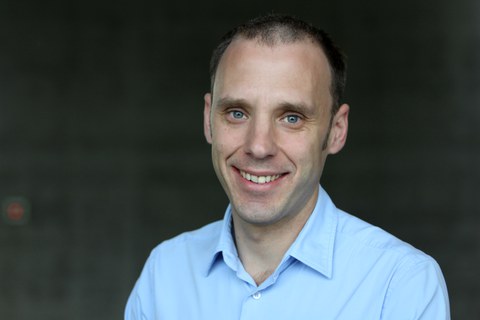Jul 30, 2015
BIOTEC Professor Stephan Grill Appointed Max Planck Fellow
The Dresden-based biophysicist Stephan Grill combines combines biology with physics and theoretical physics to bridge the gap between the molecular, cell and tissue mechanical understanding of morphogenesis. Stephan Grill and group made the fundamental discovery of torque-generation inside the actomyosin cortex, which has an impact on early developmental processes like the establishment of the left-right body axis.
Stephan Grill (41) studied Physics at the Ruprecht-Karls-Universität Heidelberg and worked at the European Molecular Biology Laboratory (EMBL) afterwards. He did his doctorate at the TU München in 2002 and continued his research as a postdoc at the Max Planck Institute of Molecular Cell Biology and Genetics (MPI-CBG) in Dresden from 2001 – 2004. Until 2006 Stephan Grill worked at the Lawrence Berkeley National Laboratory in the U.S. and subsequently joined the Max Planck Institute for the Physics of Complex Systems and at the MPI-CBG from as research group leader. Since 2013, he is Professor of Biophysics at the Biotechnology Center of the TU Dresden.
So far, Stephan Grill has published more than 50 publications, many of them in highly recommended scientific journals. He has been awarded several prizes for his scientific success, e.g. 2009 the Award for Research Cooperation and Highest Excellence in Science (ARCHES) of the German Ministry of Education and Research and the Minerva Foundation. In 2010, Stephan Grill received the EMBO Young Investigator Award and in 2011 the ERC Research Grant as well as the Paul Ehrlich and Ludwig Darmstädter Young Investigator Prize. In 2013, he was awarded the Binder Innovation Prize of the German Society for Cell Biology.
The Max Planck Fellow Programme of the Max Planck Society was established in 2005 in order to promote the cooperation between outstanding university professors and Max Planck Society researchers. The appointment of university professors as Max Planck Fellow is limited to a five –year period and also entails the supervision of a small research group at a Max Planck Institute. The funding can be extended for 5 more years on a one-off basis.
Apart from Prof. Grill, Prof. Elly Tanaka, Prof. Michele Solimena, Prof. Michael Ruck and Prof. Roland Ketzmerick have been appointed Max Planck Fellows during the last years. In Germany, there are approximately 40 Max Planck Fellows, 5 of them at the TU Dresden.

